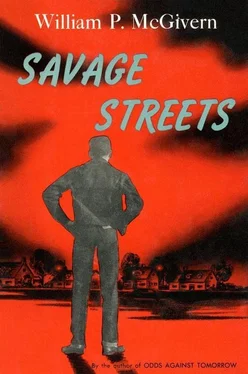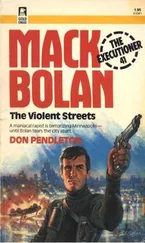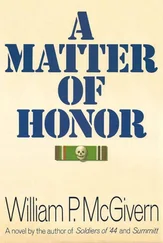William P. McGivern
Savage Streets
TO
The Honorable Thomas Carrington Gawthrop
FOR FRIENDSHIP AND ASSISTANCE
John Farrell and Sam Ward got off the train together at Rosedale, a suburban station twenty-three miles from New York City. As they joined the crowd moving toward the commuters’ parking lot, Sam Ward took Farrell’s arm and said, “Now let me just sum this thing up, okay John?”
For the past half hour — the normal running time between Grand Central and Rosedale — Ward had been complaining in a random but energetic fashion about the golf dub both men belonged to; and now, Farrell thought, he obviously felt the good executive’s need to recap his thinking. And Farrell also realized there was no graceful way of escaping this; Ward’s hand was on his arm with the authority of an arresting policeman.
“We’re a small club and a new club, granted,” Ward said, steering Farrell along by the elbow. Everyone was in a hurry at this hour of day, the crowd streaming like water toward wives and cars waiting in the parking lot, but Ward kept himself and Farrell abreast of the current without disrupting the continuity of his comment. “Okay, we’re small and new, period. That doesn’t mean we have to be cheap, does it?”
“Well, not necessarily,” Farrell said.
“Of course, when I say ‘cheap’ I’m not talking about money or anything physical, you understand. I’m talking about tone. ” Ward’s voice was loud and belligerent, which was in keeping with the way he walked, looked and thought; he was stocky, red-faced and pugnacious, a blunt, no-nonsense sort of person who wore a black Homburg and Chesterfield overcoat and seemed to be rushing eagerly toward middle age, impatient for the responsibilities and perquisites of seniority. In a few more years. Ward (he was now thirty-two) might turn into an authentic character, Farrell thought. Old Man Ward — “the Old Man shook hell out of the St. Louis office on his last trip. Did you hear about it?”
“What do you mean by tone?” Farrell asked him.
“Damn it, you know what I mean. Little things. Members leaving caddie carts piled up in front of the pro shop while they go down to the locker for a beer. Kids taking pop bottles to their wading pond. Aside from the danger of broken glass, it makes the place look like a junk yard. Third, the rules about dress, as you know only too well, are either laughed at or ignored. Ties and jackets in the restaurant and lounge, that’s the regulation, and it doesn’t seem too much to ask, if you ask me. But you know as well as I do that half the members wander around both those places in sports shirts. And here’s another thing: some of the waiters are getting familiar as hell lately. And it’s the members who encourage that crap who’re chiefly to blame. You know some people think it’s great to have waiters call them by their first names and kid them about hang-overs and that sort of thing. They think it proves they’re nice guys. Well, you either have a well-run club, or you have something else altogether. Now take the Detweillers, for instance. They’re friends of yours, right?”
“Chicky and Bill? Sure.”
“Okay, they’re friends of mine, too, but they treat the club like a playpen. Every time they get a few extra drinks it’s the same story. College songs, arms around waiters, both of them behaving like a pair of drunken teen-agers. Hell, I’ll take a drink with the next guy, but my policy has always been, if you can’t handle the stuff then leave it strictly alone. Do you understand what I mean?”
“Well, it’s a good policy. I understand that much.”
“Did you hear about Chicky the other night?”
“No, what did she do?”
“Climbed up on the bar after a few Scotches and went to sleep. And Mac, our idiot bartender, crossed her hands over her chest and put a cherry in her mouth. Isn’t that cute? Isn’t that a nice sight for someone coming in with his family, say, for a drink before dinner? I tell you, we’ve got to take up some slack while there’s still time. I know Rome wasn’t built in a day, but one day a couple Romans got together and started to build it. And that’s what we’ve got to do. Get moving before it’s too late.”
John Farrell laughed as they moved along with the crowd toward the end of the platform. The evening light was pale and dim, and the cold salt-sharpened wind off the Sound whipped his topcoat about his legs.
“What’s funny?” Ward asked him.
Farrell said, “Nothing,” but in fact Ward’s comment about Rome had raised a preposterous image in his mind, that of two togaed figures standing on a lonesome and wind-swept plain somewhere in the middle of Italy. He invented some dialogue for them: “Well, we can’t build it in a day, damn it!” There was the pessimist harrying the man of vision. “But we can start, can’t we?” And that was Sam Ward, one day to be a consul of Rome, and one day (even more certainly) to be a vice president of Texoho Oil Company, a vast industrial complex he presently served in an important minor capacity.
“My idea is to get the interested people together in an informal committee,” Ward said, glancing about the graveled parking lot for his car. “We’ll decide what we want done, and then make sure it is done. Okay, John?”
“Let me think about it.” Farrell saw the specter of committee work rising out of Ward’s dissatisfactions; nights spent in slaying miniature dragons, of hashing the obvious to pieces, of too much coffee and Scotch, and a great deal of censorious talk about abuses and indiscretions committed by absent members and their families. “Okay?” he said, pulling his arm gently from Ward’s grip. “We’ll think it over, okay?”
“Well, sure,” Ward said doubtfully. “But we don’t want to let things get too far out of hand. Bad habits have a funny way of turning into traditions, you know.” He smiled in surprise at his epigram. “Hey, that would be the way to put it, I think. Tactfully, I mean.”
“That’s an idea,” Farrell said.
Sam Ward’s wife honked for him and he turned and waved toward her dark head. “Can we give you a lift, John?”
“No, I’ll walk. It’s the only exercise I get. Say hello to Grace for me, will you?”
“Hey, you’re seeing us tonight, remember?”
Farrell hadn’t remembered, but he nodded and said, “Sure thing. See you later.”
“Right.” Ward waved good-by to him, and went sturdily across the lot to his car, holding the brim of his Homburg against the gusts of wind sweeping down the sides of the train. The crowd thinned out quickly in well-rehearsed patterns: wives were kissed, cars circled the lot with military precision, and by the time Farrell had gone down the wooden steps to the sidewalk the Express was pulling away from the station and only a few stragglers were left on the platform.
The village of Rosedale was peaceful and picturesque in the falling evening light. Everything seemed calm and attractive and permanent; the discreetly expensive shops (for cheeses and wines and riding apparel), the white clapboard church, the colonial courthouse with well-tended lawns and privet hedge, the small square, the equestrian statue of General Grant — all of this was something more than real estate, it was a way of life kept sacrosanct by rigid zoning, preserved in sentiment by the old families who still maintained the big homes on the south shore of the Island. This was the oldest section of the Township; there were no hamburger stands here, no ice cream palaces or noisy barrooms, no garishly illuminated real estate offices. Everything from the burnished whipping post behind the courthouse to the extravagant maples along the main street had been grimly held against the forces of progress.
Читать дальше












